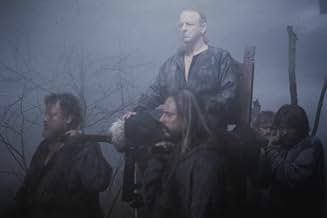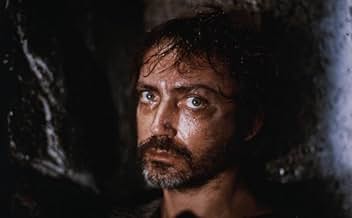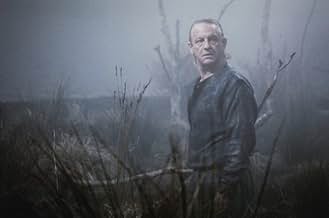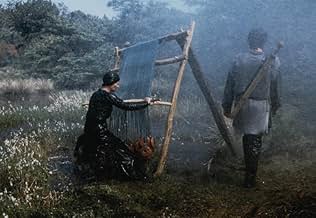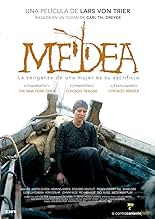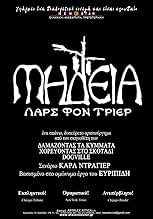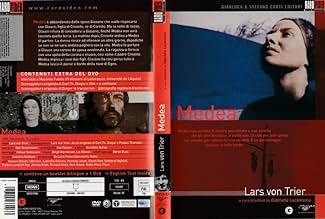Medea
- TV Movie
- 1988
- 1h 17m
Medea is in Corinth with Jason and their two young sons. King Kreon wants to reward Jason for his exploits: he gives the hand of his daughter, Glauce, to Jason as well as the promise of the ... Read allMedea is in Corinth with Jason and their two young sons. King Kreon wants to reward Jason for his exploits: he gives the hand of his daughter, Glauce, to Jason as well as the promise of the throne. In exchange, Medea and the boys are to be banished. Jason explains that his action... Read allMedea is in Corinth with Jason and their two young sons. King Kreon wants to reward Jason for his exploits: he gives the hand of his daughter, Glauce, to Jason as well as the promise of the throne. In exchange, Medea and the boys are to be banished. Jason explains that his actions ensure a rich future for Medea and her sons. She asks that she be allowed to stay; Kreon... Read all
Featured reviews
The actors´ performances (above all Kirsten Olesen, incidentally one of Denmark´s top actresses makes you gasp), the wide landscapes and carefully selected sparse dialogue, but especially Lars von Trier´s direction makes this film a shocking look into the disturbed mind of a woman who has been scorned and left. Medea´s revenge is horrible but never unbelievable. She does what every sane person would do, when deprived of all that she loves. The film burns itself into your mind and leaves you with a lasting impression of what human misery can be like.
A veritable piece of art, belonging up there with most of von Trier´s works - and above all up there with ALL of Dreyer´s works!
But there are really few makers who can consistently furnish the sunsets, and link between them, that reveal something of planets in their orbits. Tarkovsky is king of that close vision from faraway. Watching this makes me lament Trier, because he could have been our current Tarkovsky, much more than either Tarr or Kusturica, who both flirted with carrying the mantle of that cosmogonic art.
This one lacks that orbital vision in different narrative planes (we only have one thread), and is mostly, rapturously devoted to tone poetry of elemental intimacy. It was very early in Trier's career anyway, but it's still a better and more visual third film than most directors ever managed. It's beautiful, but not in the clean sense of a David Lean epic. I prefer it this way.
That is partly because he's working from a barebones story that is ancient myth as interpreted by Euripides (and written into a script by Carl Dreyer): Medea has fled to Corinth promised marriage by the Argonaut Jason, who reneges on that promise when offered the hand of the daughter of the local king. Medea together with her two children is banished from the city.
It is a simple story of injustice. You are going to anticipate every turn, including (probably) the most tragic finale. It is the conventional Medea of myth, betrayed mother, woman, vengeful enchantress of cthonic witchcraft.
But the visual bell boom of this Rublev stretches far and wide, as he rings into being a gauzy world of untime, last fires, and first voyages out to cloudy sea. If only he hadn't lost himself in anger and cynical pessimism.. Tarr has followed suit. I think about the only thing that can keep an intelligent mind sane, is finding rhyme and music in unreason.
How big the debt to Dreyers movies are I cant tell as I haven't seen any of his work yet due to poor availability, but as huge it seems it actually makes me a big fan of Dreyer himself, which von Trier also is and don't try to hide.
Metaphors are a plenty here and somehow it works, experiments with filming, post production and so on is evident and really made this a wonderful testimony to an inspired mind. Respect to Lars! Especially for the water scenes, the wind, the golden fleece ...
Art direction may not be 100% historically correct, but it looks very good, Medea herself must have inspired 'Orbital' for their 'The Box' music video some years later.
The revenge she gets are the most raw and brutal I have seen by the way.
Medea is very much trapped in an imposed psychology, as are we all. The gods are pulling all the strings, or so it seems. She is not callous, not mechanical in killing her children, but tortured as she does fate's bidding. The children are part of the same system and must play their role in honouring their mother's agony. The tragedy is in the passive resignation. Trier communicates this far better than Pasolini, who communicated next to nothing in his version. We're watching someone plumb the very abyss of misery on account of simple vanity. That has always been worth some reflection.
Did you know
- TriviaLudmila Glinska's only film role. She plays 'Glauce' and is credited as Ludmilla Glinska.
- ConnectionsFeatured in Tod eines Weltstars (1992)
Details
Box office
- Gross US & Canada
- $16,714
- Opening weekend US & Canada
- $2,379
- Apr 20, 2003
- Gross worldwide
- $16,714
Contribute to this page


